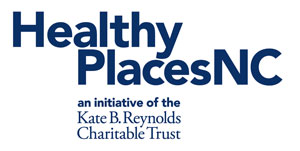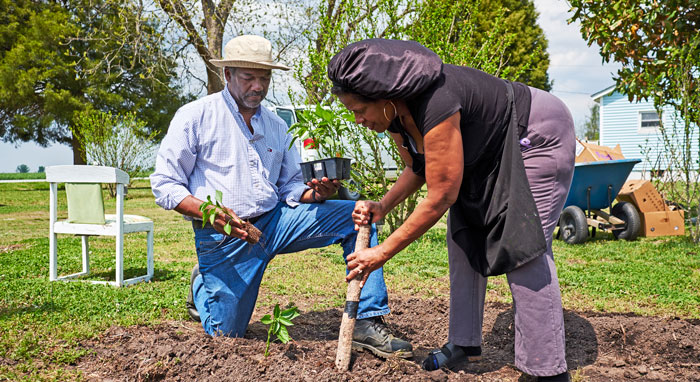Healthy Places NC
- Need: Due to systemic issues and historic lack of investment, people living in under-resourced rural communities in North Carolina– especially people of color– have poorer health than those living in urban areas.
- Intervention: Funded by the Kate B. Reynolds Charitable Trust, Healthy Places NC invested $100 million over 10 years in rural North Carolina counties to improve residents' health.
- Results: Healthy Places NC has generated excitement and promoted collaboration in the participating communities. A full evaluation of the first 10 years of the program was released in early 2024.
Description

The Kate B. Reynolds Charitable Trust works for equitable access to quality health care, education, and economic opportunity for every resident of Forsyth County and across the state of North Carolina. The Trust works in partnership with communities for racial equity and systems change, as data show that too many people are marginalized by race and place.
Launched by the Trust in 2012, Healthy Places NC first worked with 10 of the state's most rural and under-resourced counties to improve health outcomes and help residents thrive. The Trust team spent time listening to and learning from residents about the opportunities and challenges facing their communities. Over 10 years, residents of Healthy Places NC counties – led by grassroots organizations and people of color – have worked to tackle issues including substance misuse, adverse childhood experiences (ACEs), equitable food systems, and access to recreation.
The initiative began with 10 Healthy Places NC counties:
- Beaufort
- Bladen
- Burke
- Columbus
- Halifax
- Edgecombe
- McDowell
- Nash
- Robeson
- Rockingham
In 2022, the Trust announced it had reached its $100 million commitment to those counties. The Trust's work with rural communities continues under the Healthy Places NC name and includes a special focus on Eastern North Carolina, where data shows the largest health disparities by race and place in the state.
The Trust remains partnered with community leaders, connecting them to regional and statewide initiatives that are working to change systems and improve health.
Services offered

Healthy Places NC counties identify health issues, set goals, and build capacity for their residents to lead and complete the work. Health issues that have been identified as priorities by Healthy Places NC counties include:
- Equitable access to healthy food and recreation: increasing healthy and active living in communities with low incomes
- Substance misuse: reducing rates of substance misuse and overdose deaths
- Adverse childhood experiences: addressing childhood trauma for children from neighborhoods with low incomes
Results
A full evaluation of the first 10 years of the program was released in early 2024. As indicated in the report, Healthy Places NC has generated excitement and promoted collaboration in the participating communities. Moreover, the Trust reports that the initiative sparked a transformational shift in the way they work and deepened their commitment to listening to community members, applying an equity lens, and focusing on scale and sustainability. The Trust and the participating counties continue to:
- Cement health improvement as a shared community value
- Focus on changing the systems that have historically held residents back
- Establish and build relationships with organizations led by and serving people of color
- Build regional infrastructure across grassroots groups to spur health improvement efforts
- Activate community leadership in ways that reallocate power and influence
- Achieve quantifiable progress toward improving outcomes on major health indicators
Challenges
Place-based philanthropy is often replete with challenges and Healthy Places NC has been no exception. The design of Healthy Places NC evolved over 10 years in response to challenges and perspectives gained from new people throughout the initiative. As detailed in the Healthy Places NC 10-year evaluation report, these are the main challenges that emerged during the work:
- Difficulty clarifying and communicating the nature and purpose of the work.
- Confusion from too many external partners with too little alignment.
- Building capacity to implement a complex model in complex communities.
- Too many disparate efforts supported in each Healthy Places NC county.
- Underestimating how sticky existing power structures can be.
- Linking local and state-level efforts.
- Evaluating emergent, uncertain, long-term work.
Read more about these challenges and how the Trust addressed them in the 10-year report.
Replication
The Healthy Places NC 10-year report also provides insights for fellow funders in various sectors who want to shift norms, power dynamics, and other conditions that produce inequity, particularly in rural communities.
Key lessons learned
- Be self-reflective and transparent about the foundation's appetite for being "community-driven" versus "foundation-driven" throughout the evolution of the work. Make implicit assumptions and values as explicit as possible, as often as possible.
- Develop a clear shared analysis of how community change happens and philanthropy's role in it. Intentionally test and refine assumptions based on what actually happens (and doesn't happen).
- To know where to invest, program officers should spend considerable time in communities, meeting with a variety of local stakeholders, listening, and learning.
- Communities are not homogenous. When a foundation adopts a community-driven philosophy, it must make choices as to which stakeholders it will support and whose interests will be advanced.
- When a foundation adopts a racial equity lens, it will want to see new work happen in communities, some of which involves a shift in power.
- Differences in capacity across groups and organizations are the result of inequitable access to financial and capacity-building resources both historically and currently. Repairing those imbalances requires capacity-building to be targeted to traditionally excluded groups so that they are comparably resourced to engage in community change.
- Although long-term community systems change can benefit from brokering relationships between established institutions and grassroots groups, foundations need to lay groundwork first to guard against tokenization and cooptation.
- Community change is deeply relational work. Progress can be disrupted by turnover among foundation staff and implementing partners. Expect turnover and develop a continuity strategy.
- Standardized capacity-building approaches delivered by high-profile national organizations aren't always a good fit for rural communities—or for complex community change efforts in general. When possible, invest instead in customized local support, as well as peer-to-peer and community-to-community learning to enhance capacity.
- Although some critical systems change capacities can be embedded within rural communities, most don't have the market or population stability required to sustain them. A broader regionals support infrastructure is critical to support ongoing community change efforts and health equity in rural communities.
- Conventional foundation approaches to evaluation and expectations for success aren't a good fit. Prepare foundation staff and boards to think about success differently and to take a long view.
Contact Information
Nora Ferrell, Director of CommunicationsKate B. Reynolds Charitable Trust
Healthy Places NC
336.397.5515
nora@kbr.org
Topics
Philanthropy
Population health
Wellness, health promotion, and disease prevention
States served
North Carolina
Date added
June 8, 2015
Date updated or reviewed
August 29, 2024
Suggested citation: Rural Health Information Hub, 2024. Healthy Places NC [online]. Rural Health Information Hub. Available at: https://www.ruralhealthinfo.org/project-examples/801 [Accessed 13 December 2024]
Please contact the models and innovations contact directly for the most complete and current information about this program. Summaries of models and innovations are provided by RHIhub for your convenience. The programs described are not endorsed by RHIhub or by the Federal Office of Rural Health Policy. Each rural community should consider whether a particular project or approach is a good match for their community’s needs and capacity. While it is sometimes possible to adapt program components to match your resources, keep in mind that changes to the program design may impact results.
